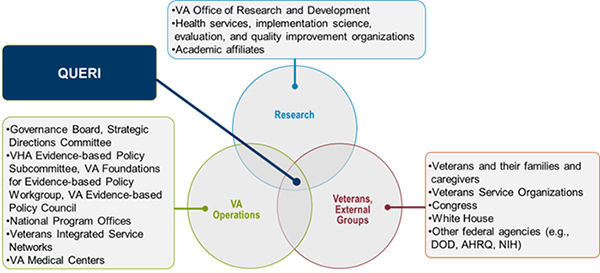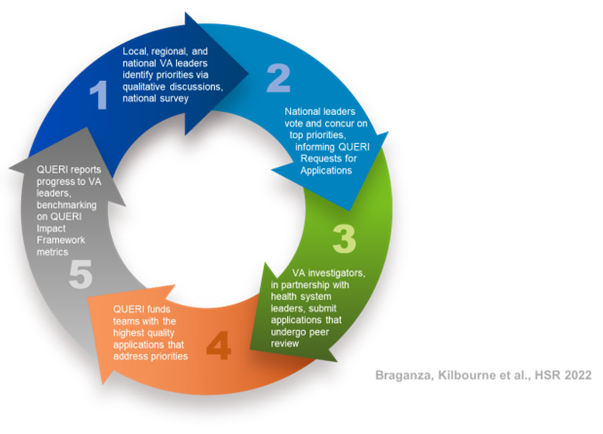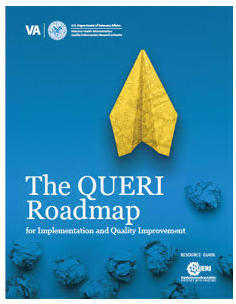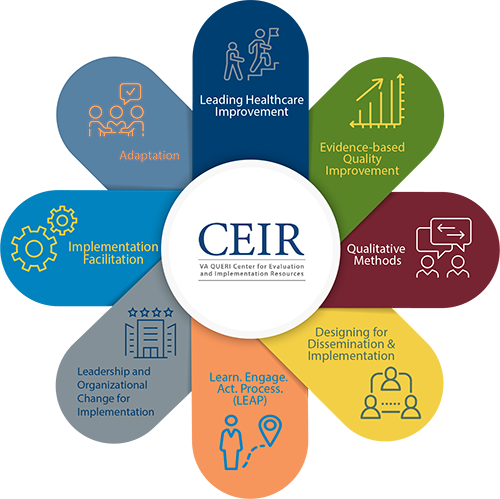
Spring 2023
Evolution of QUERI: 1998 to 2023Over the past quarter century, VA’s Quality Enhancement Research Initiative (QUERI) has undergone tremendous growth, expanding from 10 disease-focused centers to a national network of more than 45 cross-cutting centers. The road leading to QUERI’s integration within the VA healthcare system – and its recognition as a leader in implementation science (IS) and evidence-based policy – was paved with the bold vision of QUERI leadership and the innovation and dedication of QUERI investigators and staff. 
From the start, QUERI has made significant strides in ensuring that evidence-based best practices are implemented into routine care so that Veterans consistently receive the best possible care at every VA facility. In turn, VA can learn from these experiences to shape the next generation of programs and policies affecting Veterans, their families, and caregivers. I frankly don't know what [we] would do without QUERI... an absolutely indispensable partner in providing objective third-party implementation evaluation. And more responsive than any other partner we have in any domain. —National VA Program Office Leader Translating Research Findings to Inform Healthcare for VeteransThe QUERI Program was designed by VA health system and research leaders in response to VA’s transformation from a hospital-based system to a large, integrated health system. At that time, there was an urgent need to identify new strategies for achieving rapid quality improvement in primary care settings, especially for disease-specific conditions once relegated to hospital care. Thus, QUERI’s original purpose was to harness VA’s health services research expertise and resources in an ongoing system-wide effort to improve the performance of the VA healthcare system overall and, thus, the quality of care for Veterans. In this way, VA researchers became more directly and systematically involved in moving the needle on quality of care by promoting the uptake of evidence for the most common conditions managed in primary care settings. (Stetler, Mittman, Francis, 2008) Initial efforts to leverage research to enhance Veteran outcomes and improve efficiency involved:
QUERI teams employed concepts and approaches from what has become known as implementation science. Sometimes referred to as knowledge translation, improvement science, or translational science, IS was a field in its infancy at the time of QUERI’s inception, built upon interdisciplinary theories and frameworks from the organizational psychology, medical education, social sciences, and public health fields. Implementation science is “the scientific study of methods to promote the systematic uptake of research findings and other evidence-based practices into routine practice, and, hence, to improve the quality and effectiveness of health services.” (Bauer et al., 2015) By taking advantage of the embedded nature of its research program in a national healthcare system, QUERI investigators were able to develop novel frameworks (Damschroder, et al., 2009), methods, and strategies (Rubenstein, et al 2010; Kirchner, et al., 2014; Kilbourne, et al., 2020) that were used to expand Veterans’ access to state-of-the art treatments. QUERI also made the business case for implementation science to clinical and operational leaders. As healthcare systems worked under increasingly dynamic and resource-constrained conditions, evidence-based implementation strategies were considered essential to ensuring that research investments maximized healthcare value and improved public health (Rubenstein, et al 2010; Kirchner, et al., 2014). QUERI has historically been an outstanding partner with our program office and has developed implementation strategies that improved patient care in VA. —National VA Program Office Leader Deploying a Learning Health System Approach to Support National GoalsQUERI continued to stay at the forefront of advancements in health services research and implementation science, leveraging new models and frameworks, such as the Learning Health System, to address organizational goals and Veterans’ needs. To support VHA’s transformation to a Learning Health System, which involves the systematic integration and use of performance data and research evidence to accelerate sustainable, system-wide care improvements, QUERI began to partner with national leaders to evaluate the rollout of national programs affecting Veterans (Committee on the Learning Health Care System in America, 2013). For example, QUERI’s Center for Evaluating Patient-Centered Care (EPCC) was created to examine the implementation and impact of VA’s transformation to a Whole Health (WH) system of care, which empowers and equips Veterans to take charge of their health and wellbeing and to live their life to the fullest. The EPCC QUERI work on the Whole Health flagships has created huge implementation momentum for QUERI work. This is a great example of a true learning healthcare system. —Benjamin Kligler, MD, MPH, Executive Director, VA Office of Patient-Centered Care & Cultural Transformation (OPCC-CT) In response to the passage of the Veterans Access, Choice and Accountability Act of 2014 (Choice Act) and VA’s national reorganization, QUERI revised its strategic goals and funding opportunities to reflect updated VA priorities (Kilbourne et al., 2017). To better align with VA priorities focused on reducing unwanted clinical variation and enhancing Veteran access to care, QUERI established 15 cross-cutting Program centers that partnered with National VA Program Offices to scale-up and spread effective practices across the country. These QUERI centers focused on addressing complex health care challenges, including healthcare access, mental health and suicide prevention, chronic pain care, and patient safety and quality, and sought to improve the health and well-being of Veterans, particularly at-risk, marginalized, and underserved Veterans. I have enjoyed the truly unique opportunity to participate in all parts of our Learning Healthcare System by providing healthcare, improving healthcare, evaluating healthcare services, and disseminating best practices. —QUERI Investigator/Staff Policy became a mission-critical priority, and QUERI funded several rigorous evaluations to inform implementation of the Choice Act (Mattocks et al., 2017; Finley et al., 2017; Gellad et al., 2017; Vanneman et al., 2017; Sayre et al., 2018). The QUERI Partnered Evidence-based Policy Resource Center (PEPReC) was established to provide analytical and evaluation support on key policy, planning, and management initiatives and legislative mandates, such as the MISSION Act. In 2019, QUERI began working with the VHA Chief Strategy and Finance Offices to create an enterprise-wide approach to evidence development and evaluation – and support implementation of the Foundations for Evidence-Based Policymaking Act (Evidence Act) in VHA. PEPReC took the lead on coordinating VHA’s response to the Evidence Act, including reviewing legislative, budget, and regulatory proposals and developing annual evaluation plans, learning agendas, and capacity assessments. The success of these efforts led to the establishment of the Evidence-based Policy Subcommittee to serve as VHA’s principal hub for aligning and focusing evaluation efforts and resources to inform evidence-based policy. It also led to the creation of six QUERI-funded Evidence-based Policy Evaluation Centers to address complex policy questions identified by the Subcommittee. QUERI continues to provide implementation and evaluation support to address short-term, medium-term, and long-term priorities – and has provided support to program offices in addressing key legislative priorities, including the STRONG Act, the Hannon Act, and the PACT Act (Braganza et al., 2022). 
QUERI engages diverse groups to address multi-level operational, policy, and research priorities Implementing VISN Priorities at the Frontline LevelIn 2017, QUERI began partnering with VISN (Veterans Integrated Services Network) leaders to implement VISN priorities at the clinic level to achieve tangible improvements in quality and performance. QUERI identified VISN priorities through an annual national survey and live voting process, and then funded several national quality improvement initiatives to address these priorities; for example, expanding Veterans’ access to opioid use disorder and pain treatments, implementing suicide prevention strategies, and addressing health disparities (Braganza et al., 2022). Key QUERI-VISN Partnered Implementation Initiative impacts, to date, include implementing:
[The] quality that I enjoy most about QUERI projects is the focus on timely improvements in Veteran care. Essentially, these projects are trying to improve Veteran care today or tomorrow, as opposed to many years in the future. —QUERI Investigator/Staff Recently, QUERI broadened the VISN priority nomination process to gather feedback from additional VHA governance and strategic groups and to ensure all QUERI initiatives are aligned with VA’s highest priorities and Veteran needs. This systematic, enterprise-wide process involves:

QUERI's Systematic Process to Implement VHA priorities at the Frontline Level: Identifying priorities, funding initiatives to address priorities, communicating results and impacts Promoting the application of implementation and quality improvement science to real-world practice and across the translation spectrum
In response to the increased demand for evaluation services, the QUERI Center for Evaluation and Implementation Resources (CEIR) was created to provide time-sensitive consultation and resources to VA leaders, providers, and researchers interested in using implementation, evaluation, and quality improvement methods to deploy a program or policy to improve Veteran care. CEIR developed several tools to support VA leaders, managers, providers, and researchers in planning, designing, and implementing evaluations of programs and policies, including the QUERI Implementation Roadmap Guide and the QUERI Evaluation Guide. One of CEIR’s notable achievements was to create an Implementation Planning Assessment (IPA) Tool, which can help accelerate the implementation of effective clinical interventions by infusing implementation science principles in ORD Cooperative Studies Program (CSP) clinical trials (Kowalski et al., 2022). 
Over the last few years, QUERI has continued to expand evaluation capacity through offering training and mentoring opportunities in implementation and quality improvement strategies. Since 2018, QUERI has funded nine Learning Hubs to provide virtual and in-person training in specific implementation strategies to help VA employees improve care at their site. In 2020-2021, QUERI launched QUERI Program Mentoring Cores and the Advancing Diversity in Implementation Leadership (ADIL) initiative to foster career development and independent project opportunities for early career investigators and staff (Kilbourne et al., 2022). Most recently, the QUERI Evidence, Policy and Implementation Center (EPIC) was launched to promote peer learning across the QUERI community, including ADIL awardees, and to enhance the uptake of implementation science methods across the translation spectrum. QUERI’s Past, Present, and FutureQUERI is now a nationally recognized leader in implementation science and an emerging thought leader in applying implementation science to solve healthcare challenges and promote evidence-based policymaking. Over the last 25 years, QUERI has grown tremendously – partnering with more than 100 National VA Program Office and VISN leaders to move the needle on quality of care, expanding implementation and quality improvement training opportunities for VA employees, and developing pathways to support early career investigators and staff. Looking forward, QUERI will continue to build on decades of experience in implementation, evaluation, and multi-level engagement to help foster evidence-informed program, policy, and budget decisions across VHA. |